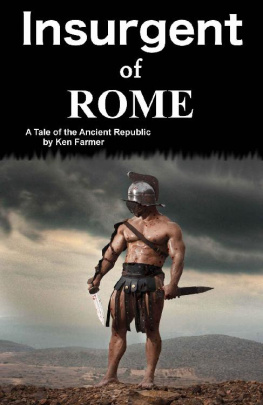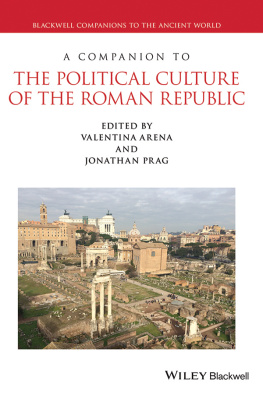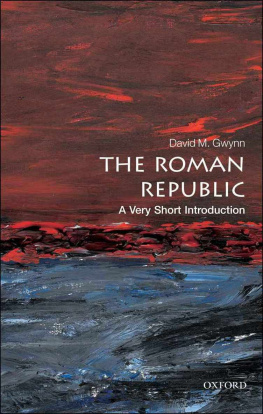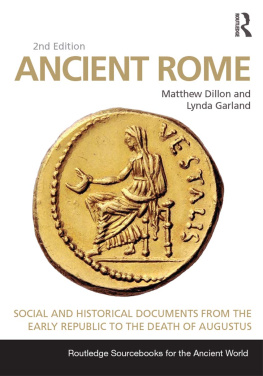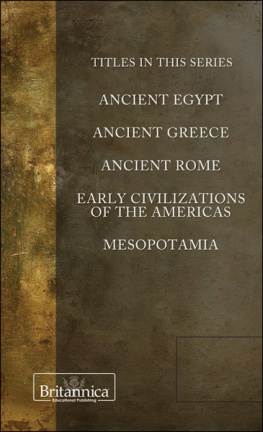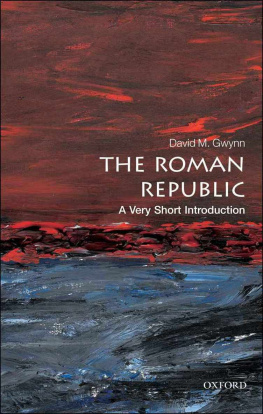Ken Farmer - Insurgent of Rome: A tale of the Ancient Republic
Here you can read online Ken Farmer - Insurgent of Rome: A tale of the Ancient Republic full text of the book (entire story) in english for free. Download pdf and epub, get meaning, cover and reviews about this ebook. year: 2019, genre: Adventure. Description of the work, (preface) as well as reviews are available. Best literature library LitArk.com created for fans of good reading and offers a wide selection of genres:
Romance novel
Science fiction
Adventure
Detective
Science
History
Home and family
Prose
Art
Politics
Computer
Non-fiction
Religion
Business
Children
Humor
Choose a favorite category and find really read worthwhile books. Enjoy immersion in the world of imagination, feel the emotions of the characters or learn something new for yourself, make an fascinating discovery.
- Book:Insurgent of Rome: A tale of the Ancient Republic
- Author:
- Genre:
- Year:2019
- Rating:4 / 5
- Favourites:Add to favourites
- Your mark:
- 80
- 1
- 2
- 3
- 4
- 5
Insurgent of Rome: A tale of the Ancient Republic: summary, description and annotation
We offer to read an annotation, description, summary or preface (depends on what the author of the book "Insurgent of Rome: A tale of the Ancient Republic" wrote himself). If you haven't found the necessary information about the book — write in the comments, we will try to find it.
Ken Farmer: author's other books
Who wrote Insurgent of Rome: A tale of the Ancient Republic? Find out the surname, the name of the author of the book and a list of all author's works by series.
Insurgent of Rome: A tale of the Ancient Republic — read online for free the complete book (whole text) full work
Below is the text of the book, divided by pages. System saving the place of the last page read, allows you to conveniently read the book "Insurgent of Rome: A tale of the Ancient Republic" online for free, without having to search again every time where you left off. Put a bookmark, and you can go to the page where you finished reading at any time.
Font size:
Interval:
Bookmark:
Insurgent of Rome
A Tale of the Ancient Republic
By
Ken Farmer
Copyright 2019 Ken Farmer
All Rights Reserved
Registered US Copyright Office
Cover image licensed from Shutterstock.com
All other images copyright Ken Farmer
Other books by Ken Farmer
Outlander of Rome
Founder of Rome
Scrivener of Rome
Artisan of Rome
Defender of Rome
Wanderer of Rome
Champion of Rome
Publishing History
05/05/2019
Forward
Romans had an odd way of marking time (at least, to moderns with atomic clocks and nanosecond apps on smartphones). Day and night were considered separately and each given twelve hours. Since the length of both change daily, each hour was longer or shorter than those on the preceding day and night. A sundial would handle such variable lengths in the day, just by the nature of its construction, but how the varying hours were determined at night is beyond me. Waterclocks were common among the wealthy in the time of this book, but was there a valve with calibrated markings, or such, that was changed daily to account for the changes in length? I suspect that the answer is less technical. Humanity in those pre-electricity days was regulated by the daylight hours, and most activity spanned from sunrise to sunset. As the Romans failed to invent the 8 to 5 workday, a precise division of time was probably of lesser importance than seeing the sun rise and set.
Note that the Cleopatra (Kleoptra) in this story (a real personage of history) is not the one made famous by Hollywood spectaculars. There were many queens and princesses - and ordinary women, no doubt - throughout history, that were given that fairly common name. It is a Greek construct - klos, "glory" and patr, "father", translating to "The Glory of my/her Father."
* * * * * *
Some Ancient Roman words
Stadium, Stadia (plural) - Measure of distance. 1 mile = 10 stadia. 1 kilometer = 6 stadia. To modern readers the term can be deceptive, as a hundred stadia tends to make one think of a vast distance, but is only about ten miles, or sixteen kilometers - an easy walk for a man in a few hours - or at least it was, back in those pre-fast food days. Again, a boat that is making thirty stadia an hour is not pounding through the waves, but only moving at about 3 mph/5 kmh - a normal walking pace for person.
Archigubernus - navigator.
Aedilis - Chief of Police (the Vigilis).
Caupo - tavern keeper, innkeeper.
Crux, Crucis - literally cross. Used for the Roman punishment of crucifixion, although the usual device was not as the Christian symbol, but in the form of a 'T.'
Dexter - to the right, on the right hand. Sinister - to the left, on the left hand.
Femina (Roman) Kor (Greek) - young unmarried woman. Puella (Roman) Kortsa (Greek) - young girl.
Gladius - the short sword that Legionaries, beginning in the late Republic, used as their prime weapon.
Hispania - the ancient name for the modern land of Spain.Knucklebones - an ancient dice-like game of chance. Think of 'Craps'.
Mistress. Wife of a man not the Dominus of the house. i.e. of a second or third son. Not to describe a kept woman, as in the modern sense.
Numerarius, Ratiocinator, Calculator. Accountant, CPA, Scribe of accounts.
Puerulus (Roman) Agri (Greek) - boy
via - A road or through street. Via - A major thoroughfare, boulevard, or highway. Think Interstate or Autobahn, although only two wagon lanes wide on the average.
Stater. Heavy Greek silver coin.
Vigilis - Police, City watchmen.
* * * * * *
Military words.
Tyro - beginner, recruit.
Decanus, Decanuae(pl) - roughly a Corporal in charge of a Contubernium - a unit of seven men.
Decurio - Cavalry officer - roughly of the rank of Corporal.
Centurion - Sergeant. The backbone of the Legions. This rank had many different grades.
Locumtenens - Lieutenant.
Dux - General of the Legion(s). Generalis - a General of lesser command rank.
Consul - Commander of all the Legions.
Century - A unit of about sixty men. The standard unit of a Legion. A modern unit of this size would be large platoon.
Cacula - Batman, Orderly. An assistant for an officer.
Pilum, pila(pl) - the Roman infantry iron-shanked throwing spear. Usually two per man.
Book I
Chapter 1

"Does not our patron realize that Cosconius will not give escort to our ship with triumphant horns and words of honey?" The First Mate of the Petrel was standing with the crew, looking over the short span of water into the city of Salona, watching the citizenry move as if a hill of ants that had been trod upon.
"Aye, Kaeso. Usually, such fat merchants are first in the rabble to take flight, trampling any who are slow to move aside."
It was a crew of youngsters, none seeing more years than five and thirty, except for the Archigubernus, Patroclus of Thebes - a city of Greece, landbound and unknown to any on the ship. A man more unlikely to serve as navigator on a vessel would be difficult to find. His skill at reefing would be likely to find his leg entangled and hoisted with the sail and any attempt at the use of the rudder pole without guidance would no doubt find himself and his mates on the rocks of the nearest shore. But... His knowledge, and stash of scrolls, about the lands of the Great Sea from the eastern shores of Armenia to beyond the Pillars of Hercules at the far western opening, was unmatched by any yet known to the crew. His age of six and forty years put him well beyond the age of unmeasured activity, but he was not yet a doddering oldster. Now, he replied to the japes, "Neither the walls nor the gates are down as yet. The Legions of Cosconius may be yammering for entrance, but walls and wood seldom listen to the demands of men."
All looked forward at their Master, standing in the peak of the deck, holding on to the forward stay in the gentle swells and looking into the city, just now becoming visible in the dawning morning. Finally, the Captain turned and said, "Belt on your metal, Ngozi. We will go to find our passenger and ask if he intends to take passage or invite the Romans for wine and cakes." To the First Mate, he said, "Kaeso. Do not allow any to depart, even to yon taburna just off the dock. When we stand out, it may be with wood flying past our ears and with little measure of time to find a man ensconced with some wench."
"Aye, Capitaneus."
"And have the poles ready for use. The wind is fair for our departure, but if it changes, we will need to push out beyond arrow range." To another, he said, "Flavius. Man the flatboat."
The ship was anchored about ten strides from the wooden docks, that they might not be rushed by fleeing citizens of the doomed city. Even now, men with purses held high, were in search of any berth that might allow escape from Salona, calling over the waters their offers of metal.
Rather than attempting to climb onto the wood of the wharf, the Capitaneus pointed his man, Flavius, to pole them to the sand where the crowd was less dense, although it would not be once the horde saw their grounding. A double stride from the shoreline, he called a halt to the poling, and dropped into the waist-high water, followed by his man, Ngozi. They both turned and heaved the flatboat back into the deep, assisting the poleman in his short journey back to the ship to await their return.
Now both, and with hand on hilt, waded from the water and into the clamoring crowd, ignoring the pleas and entreaties. "A double handful of gold Darics, Kapetnios. It is yours..." "Nay, good Nauarchus. I have twenty mina of good Athenian silver. It is yours..."
Font size:
Interval:
Bookmark:
Similar books «Insurgent of Rome: A tale of the Ancient Republic»
Look at similar books to Insurgent of Rome: A tale of the Ancient Republic. We have selected literature similar in name and meaning in the hope of providing readers with more options to find new, interesting, not yet read works.
Discussion, reviews of the book Insurgent of Rome: A tale of the Ancient Republic and just readers' own opinions. Leave your comments, write what you think about the work, its meaning or the main characters. Specify what exactly you liked and what you didn't like, and why you think so.

